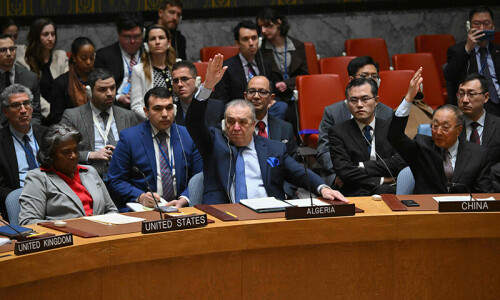NINE months into Israel’s genocidal war in Gaza, the UN Security Council has finally endorsed a ceasefire plan that promises to end hostilities in the occupied territory.
The US-sponsored three-phased plan, which was approved overwhelmingly through a resolution, with only one abstention by the 15-member UN Security Council (UNSC), has called for an immediate truce and for “fully implement[ing] its terms”. The resolution is binding on all sides.
Ever since the Israeli invasion of Gaza began last year, the UNSC has been in a deadlock over how to end the war. It is the first time that the UNSC has called for an immediate ceasefire in the Strip, which has been almost completely destroyed by Israel’s relentless air and ground strikes.
Earlier, it had adopted a resolution demanding a humanitarian ceasefire during Ramazan. But Israel refused to stop the war. Interestingly, the US has vetoed previous ceasefire proposals in the UNSC. The Biden administration has completely sided with Israel in its genocidal war.
Although it may have come too late — after the death of more than 38,000 people, most of them women and children, and the destruction of 80pc of Gaza’s buildings — the resolution offers a glimmer of hope for ending the ongoing genocide. Notwithstanding some ambiguity, the resolution is seen as a step forward towards a permanent ceasefire in Gaza.
The plan sounds very positive but the real challenge is how to get it to work.
The resolution was finalised after almost a week of hard UNSC negotiations. Despite their strong reservations over the language of the text, which appeared heavily tilted towards Israel, all UNSC members, except Russia which abstained, voted in favour. Moscow suggested an amendment in the resolution calling for a permanent ceasefire.
China said it supported the resolution because it wanted to see the fighting end and the hostages released. “We still have valid concerns on whether the parties concerned will accept the terms of the ceasefire and whether the arrangement can be carried out smoothly,” said the Chinese ambassador to the UN.
The first phase of the proposed peace plan calls for an initial six-month ceasefire, with the release of hostages in exchange for Palestinian prisoners, the withdrawal of Israeli forces from populated areas in Gaza and the return of Palestinian civilians to all areas in the territory. It also requires the safe distribution of humanitarian assistance “at scale throughout the Gaza Strip”.
The second phase calls for “a permanent end to hostilities”. This would be “in exchange for the release of all other hostages still in Gaza, and a full withdrawal of Israeli forces from Gaza”. The third phase would see the launch of “a major multi-year reconstruction plan for Gaza and the return of the remains of any deceased hostages still in Gaza to their families”.
The resolution also says that if negotiations take longer than six weeks for the first phase, “the ceasefire will still continue as long as negotiations continue”. Most importantly, the resolution rejects any attempt to change Gaza’s territory or demography, or reduce its size. It reiterates the Security Council’s “unwavering commitment to achieving the vision of a negotiated two-state solution where two democratic states, Israel and Palestine, live side by side in peace within secure and recognised borders”. It also stresses “the importance of unifying the Gaza Strip with the West Bank under the Palestinian Authority”.
All that sounds very positive but the real challenge is how to get it to work. It is now the responsibility of the US and other world powers to get the plan fully implemented.
A major question, however, is whether Israel agrees to the three-phase ceasefire plan backed by the UN’s most powerful body. While Hamas has welcomed the UNSC resolution and called for a permanent ceasefire, Israeli Prime Minister Benjamin Netanyahu has insisted that any talk of a permanent ceasefire before dismantling Hamas’ military and governing capabilities would be a nonstarter.
The proposal was rejected by some in Netanyahu’s right-wing government and it is highly improbable that the Zionist regime will agree to implement all the terms. Israel’s representative to the UN said the country’s goals in the war had not changed and that it would use military operations to free hostages as it did days before the resolution was approved by the UNSC.
It is clear that Israel will not agree on an immediate ceasefire. Netanyahu has said that Israel will fight until Hamas’s governing and military capabilities are destroyed. There is also no indication that the Israeli right-wing government would be willing to accept most of the provisions of the three-phased peace plan.
Last week’s resignation of the centrist party’s leader, Benny Gantz, from the Israeli emergency cabinet seems to have strengthened the right wing’s stranglehold on the Israeli government. The former minister developed serious differences with the prime minister over the ceasefire deal to oversee civilian affairs in postwar Gaza. His departure could push Netanyahu closer to the ultra-right parties, making it harder for him to accept the terms of the UN resolution. Far-right groups have threatened to bring down the government if the prime minister agrees to the ceasefire.
Meanwhile, Israel has intensified its bombing and ground offensive in southern and central Gaza over the last few weeks, defying international pressure to stop the aggression that has killed tens of thousands in the enclave. The International Criminal Court is seeking arrest warrants for Netanyahu on charges of war crimes and crimes against humanity.
It is apparent that Israel has become increasingly isolated in the international community with its refusal to end the war. The UN resolution provides a way out of the war but it seems the Zionist regime is still not willing to step back. It remains to be seen how much clout its closest ally can exercise.
The writer is an author and journalist.
X: @hidhussain
Published in Dawn, June 12th, 2024















































